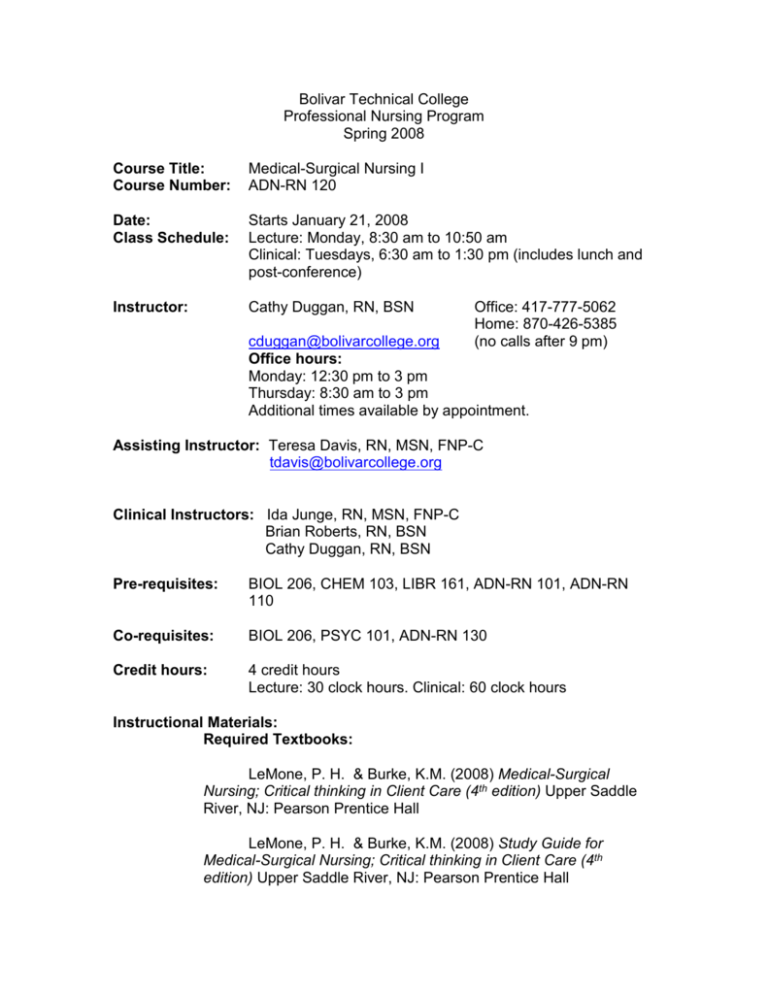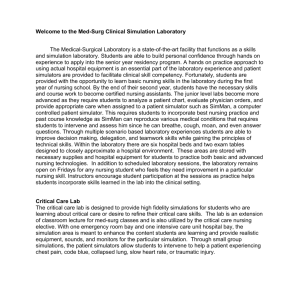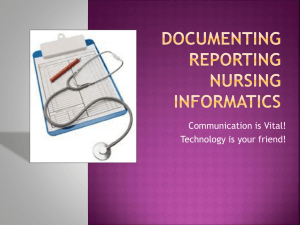
Bolivar Technical College
Professional Nursing Program
Spring 2008
Course Title:
Course Number:
Medical-Surgical Nursing I
ADN-RN 120
Date:
Class Schedule:
Starts January 21, 2008
Lecture: Monday, 8:30 am to 10:50 am
Clinical: Tuesdays, 6:30 am to 1:30 pm (includes lunch and
post-conference)
Instructor:
Cathy Duggan, RN, BSN
Office: 417-777-5062
Home: 870-426-5385
(no calls after 9 pm)
cduggan@bolivarcollege.org
Office hours:
Monday: 12:30 pm to 3 pm
Thursday: 8:30 am to 3 pm
Additional times available by appointment.
Assisting Instructor: Teresa Davis, RN, MSN, FNP-C
tdavis@bolivarcollege.org
Clinical Instructors: Ida Junge, RN, MSN, FNP-C
Brian Roberts, RN, BSN
Cathy Duggan, RN, BSN
Pre-requisites:
BIOL 206, CHEM 103, LIBR 161, ADN-RN 101, ADN-RN
110
Co-requisites:
BIOL 206, PSYC 101, ADN-RN 130
Credit hours:
4 credit hours
Lecture: 30 clock hours. Clinical: 60 clock hours
Instructional Materials:
Required Textbooks:
LeMone, P. H. & Burke, K.M. (2008) Medical-Surgical
Nursing; Critical thinking in Client Care (4th edition) Upper Saddle
River, NJ: Pearson Prentice Hall
LeMone, P. H. & Burke, K.M. (2008) Study Guide for
Medical-Surgical Nursing; Critical thinking in Client Care (4th
edition) Upper Saddle River, NJ: Pearson Prentice Hall
Perrin, R. (2007). Pocket Guide to APA Style. (2nd edition)
Boston, MA; Houghton Mifflin Company
Stedman, T.L. (2001). Stedman’s Medical Dictionary for the
Health Professions and Nursing. (5th edition) Philadelphia, P.A.:
Lippincott Williams and Wilkins
Ackley, B.J., & Ladwig, G.B. (2006). Nursing Diagnosis
Handbook: A guide to planning care (7th edition) St. Louis, MO:
Mosby.
Kozier, Erb, (2007) Fundamentals of Nursing; Concepts,
Process, and Practice (8th edition) Upper Saddle river, NJ: Pearson
Prentice Hall
Required Materials:
Uniforms, lab coats, equipment and shoes as delineated in prior
courses.
4X6 index cards, filing box, and dividers for medication cards
Clinical notebook; plastic or vinyl with pockets
Course Description:
The focus of this course is on the adaptive responses of the
individual and family to actual or potential threats to internal dimensions of wellbeing. The nursing process will be utilized to critically evaluate realistic outcomes
based on client priorities in the areas related to: perioperative nursing care;
problems related to movement and coordination; problems of ingestion, digestion
absorption, and elimination; problems of fluid, electrolyte, and acid base
imbalances; problems of oxygenation: transport and ventilation; and problems of
cardiovascular disorders (hypertension only, this course). Nursing education
focuses on learning to make sound and appropriate decisions utilizing the
nursing process. The student will continue to learn coordination of healthcare
delivery through collaboration in their role as care provider and client advocate.
Students will continue to improve their critical thinking skills, written
communication skills, and therapeutic verbal and non-verbal communication
skills. Psychomotor skill development continues with emphasis on medication
administration and IV therapy.
Learning Objectives:
Upon completion of this course, the nursing student will be able to:
Construct a nursing plan of care for an adult using the nursing process.
Show safe and effective administration techniques for administering
medications by all routes.
Demonstrate ability to initiate and maintain IV therapy in adult clients.
Explain and distinguish the specific adaptive responses to health threats in
the adult that are covered in this course.
Analyze and contrast normal and abnormal findings on assessment of an
adult.
Demonstrate caring through use of therapeutic communication,
presencing, and non-judgmental attitude toward clients, family and peers.
Apply age specific considerations to the care of adult clients of various
stages, young adult through elite old.
Use culturally sensitive and appropriate care techniques as needed in
providing client care.
Distinguish the benefits of utilizing collaborative team resources to care for
clients; physicians, therapists, dietitians, etc.
Demonstrate nursing judgment based on professional standards , ethical
values, and legal responsibilities.
Use current nursing research findings appropriately to deliver care to adult
Med-Surg clients and families.
Identify classes of pharmacologic agents in relation to expected
therapeutic actions for the disease states included in this course.
Demonstrate critical thinking skills in maintaining a safe environment and
promotes understanding of medications by the client and family.
Complete the learning objectives at the beginning of each chapter covered
in Med-Surg I.
Teaching strategies:
The instructor will use teaching strategies that include lecture and
discussion, interactive group activities, multi-media presentations,
textbook and study guide assignments, written assignments,
quizzes, and exams, as well as skills performance practice and
return demonstrations.
Topical Outline:
Review of Kozier and Erb’s Fundamentals text: Chapter 35, pp 830 - 900
Chapter 4 Nursing Care of Clients Having Surgery, pp. 53 -83
Chapter 9 Nursing Care of Clients Experiencing Pain, pp 169 – 193
Chapter 36 Assessing Clients with Respiratory Disorders, pp 1209 – 1227
Chapter 37 Nursing Care of Clients with Upper Respiratory Disorders, pp
1228 – 1264
Chapter 38 Nursing Care of Clients with Ventilation Disorders, pp 1265 –
1296*
Chapter 39 Nursing Care of Clients with Gas Exchange Disorders, pp
1320 – 1346*
Chapter 10 Nursing Care of Clients with Altered Fluid, Electrolyte and
Acid-Base Balance, pp 194 – 238 *
Chapter 12 Nursing Care of Clients with Infections, pp 286 – 327
Chapter 21 Assessing Clients with Nutritional and Gastrointestinal
Disorders, pp 604 – 628
Chapter 22 Nursing Care of Clients with Nutritional Disorders, pp 629 –
654
Chapter 23 Nursing Care of Clients with Upper Gastrointestinal Disorders,
pp 655 – 695
Chapter 25 Assessing Clients with Bowel Elimination Disorders, pp 740 –
752
Chapter 26 Nursing Care of Clients with Bowel Disorders, pp 753 – 827
Chapter 27 Assessing Clients with Urinary Elimination Disorders, pp 828 –
844
Chapter 28 Nursing Care of Clients with Urinary Tract Disorders, pp 845 –
881
Chapter 35 Nursing Care of Clients with Peripheral Vascular Disorders, pp
1153 – 1169*
Chapter 40 Assessing Clients with Musculoskeletal Disorders, pp 1379 –
1397
Chapter 41 Nursing Care of Clients with Musculoskeletal Trauma, pp 1398
– 1431
Chapter 42 Nursing Care of Clients with Musculoskeletal Disorders, pp
1432 – 1499
* indicates assignment and coverage of partial chapter content
Course requirements:
Classroom:
The student is responsible for reading all assigned material and
taking adequate notes on lecture/guest speakers.
Student must complete all assignments for success in the course.
Student must be an active learner, seeking out information, and
contacting the instructor if questions or concerns exist.
Clinical:
The student must successfully complete 60 clock hours of clinical
experience.
Successful completion is defined as: adequate preparation for
clinical, proper conduct (see handbook), safe and prudent nursing
care, adherence to agency and school policies and procedures,
and conveyance of a caring attitude. Completion of written
assignments and care plans is also important to success.
Clinical Skills Checklist: Each student is responsible for maintaining
and completing a skills checklist. This checklist is kept with the
clinical folder. Students need to obtain observer’s initials on skills
that they perform with the goal of completing all skills by the end of
Med-Surg 3. (end of program)
A copy of the skills checklist will be reviewed and turned in at midsemester and at the end of the semester.
Students should exhibit interest and enthusiasm for completing all
clinical skill opportunities. If opportunities do not occur in the clinical
setting, the clinical skills lab at the school provides simulated
practice.
Students are encouraged to use the skills lab when available to
review and improve skills already covered (such as catheterization
or NG insertion) and learn new skills (such as IV therapy and
medication administration)
Assessment criteria and methods of evaluation:
Grading scale:
94-100%
86-93%
80-85%
Below 80%
A
B
C
F
Grading procedures:
Possible points:
Theory exams (6 X 50 points)
300
Homework assignments
150
APA Format research paper
50
Clinical paperwork
150
Quizzes (announced or unannounced)
30
Clinical (pass/fail)
TOTAL POINTS POSSIBLE FOR THIS SEMESTER
680
Mid-Curriculum HESI Exam: As stated in the professional nursing
program catalog, all students will complete the HESI exam that covers content
from the first and second semesters of nursing school. A grade of 750 is required
for the student to continue in the nursing program. Students will have three
attempts to pass this exam. (The second and third attempt is at an additional cost
to student)
The HESI test provides remedial materials and an individualized remediation
plan for any student not achieving 750 on the exam. The student and a faculty
advisor will review and formulate the remediation before a retest is given. The
test must be successfully completed by July 1, 2008.
Attendance:
Refer to the student handbook for attendance policy. Attendance at lecture
and clinical is required. Make-up opportunities will be at the instructor’s
discretion. Clinical make-up fees may be charged per college policy.
Late assignments may be assessed a 10% reduction in grade, and will not be
accepted after a due date agreed upon by the instructor and student.
Plagiarism:
Plagiarism is defined as taking someone else’s work and presenting it as
your own. Plagiarism will result in a failing grade for the assignment and
may result in dismissal from the class with subsequent failure of the
course.
Conduct:
Student conduct expectations are listed in the college handbook. Students
will be required to adhere to these expectations and the ones listed below:
Insubordination to school officials, instructors or staff (including
personnel at clinical sites) is not allowed, and can result in
expulsion from the professional nursing program.
Students are expected to conduct themselves as adult learners in a
college setting. Disruptive behavior, such as talking or leaving and
re-entering the room excessively will not be tolerated. If you disrupt
the class, you will be asked to leave and 10 points will be deducted
from your overall grade.
During tests, do not leave the room unless with permission of the
instructor. Failure to abide by this will result in a 0 (zero) for the
exam/quiz. Cell phones must be kept out of sight.
NO CELL PHONE USE during class time. Please place you cell
phone on silence and use it only on breaks or at lunch.
Library/Computer:
Computers may be used for school assignments only. Students have free
access to LIRN, a computer based library reference system. Written
materials are available for check out in the library.
The college provides an e-mail account for each student’s use. All
announcements and official business will use this e-mail address.
Students must adhere to the Bolivar Technical College computer usage
policy.
ADA Students:
Bolivar Technical College is committed to providing a sound learning
environment to academically qualified students with disabilities and to comply
fully with section 504 of the Rehabilitation Act and Americans with Disabilities
Act.
Disclaimer:
Dates, textbooks, materials, and assignments on this syllabus are subject to
change by the instructor and/or the institution. All efforts will be made to notify
students in a timely fashion of any changes made.
The course calendar is a guideline to help students plan their work and
assignments. Variations from the schedule may be necessary depending upon
progression through the material.
Created: December 10, 2007
Revised: December 18, 2007
“This workforce solution was funded by a grant awarded under the President’s
Community-Based Job Training Grants as implemented by the U.S. Department of
Labor’s Employment and Training Administration. The solution was created by the
grantee and does not necessarily reflect the official position of the U.S. Department
of Labor. The Department of Labor makes no guarantees, warranties, or assurances
of any kind, express or implied, with respect to such information, including any
information on linked sites and including, but not limited to, accuracy of the
information or its completeness, timeliness, usefulness, adequacy, continued
availability, or ownership. This solution is copyrighted by the institution that created
it. Internal use by an organization and/or personal use by an individual for noncommercial purposes is permissible. All other uses require the prior authorization of
the copyright owner.”
American Heritage Dictionary - Cite This Source - Share This
in·sub·or·di·nate
(ĭn'sə-bôr'dn-ĭt) Pronunciation Key
adj. Not submissive to authority: has a history of insubordinate behavior.
in'sub·or'di·nate n., in'sub·or'di·nate·ly adv., in'sub·or'di·na'tion n.
Synonyms: These adjectives mean in opposition to and usually in defiance of established
authority. Insubordinate implies failure or refusal to recognize or submit to the authority
of a superior: was fired for being insubordinate.
Rebellious implies open defiance of authority or resistance to control: rebellious
students demonstrating on campus.
Mutinous pertains to revolt against constituted authority, especially that of a naval or
military command: mutinous sailors defying the captain.
Factious implies divisiveness, dissension, or disunity within a group or an organization:
"The army has been embroiled in a standoff battle against a [hornets'] nest of factious
groups" (Time).
Seditious applies mainly to the treasonous stirring up of resistance against a
government: rebels distributing seditious pamphlets.
Reference:
insubordination. (n.d.). The American Heritage® Dictionary of the English Language, Fourth
Edition. Retrieved December 10, 2007, from Dictionary.com website:
http://dictionary.reference.com/browse/insubordination









